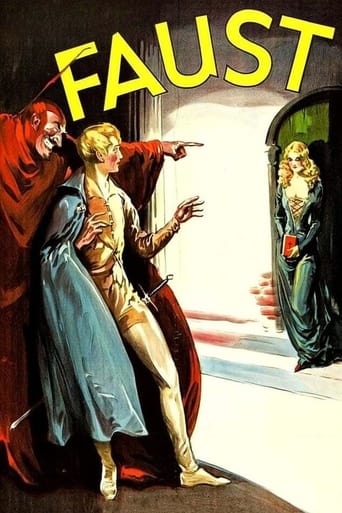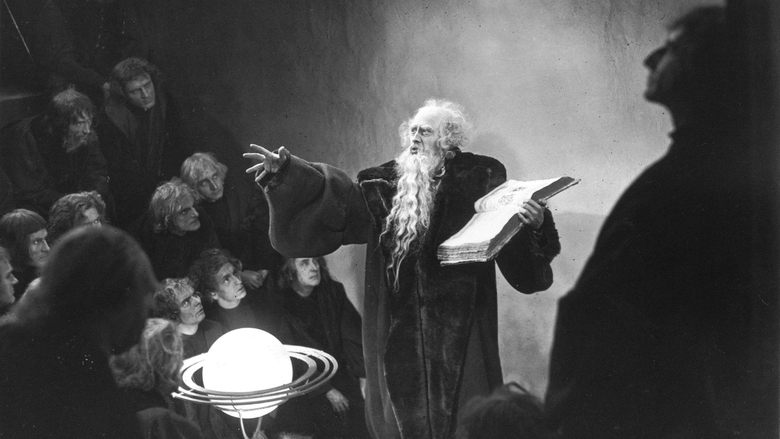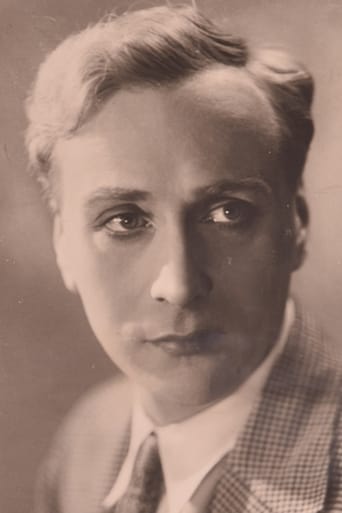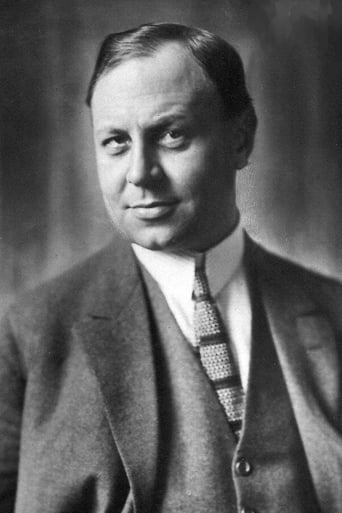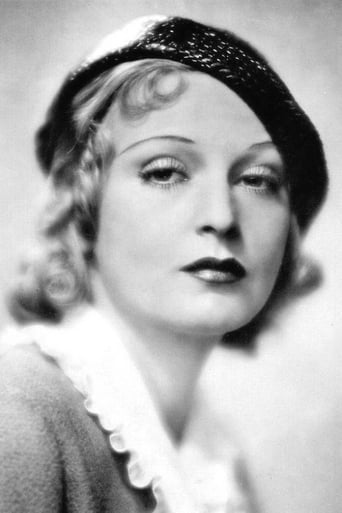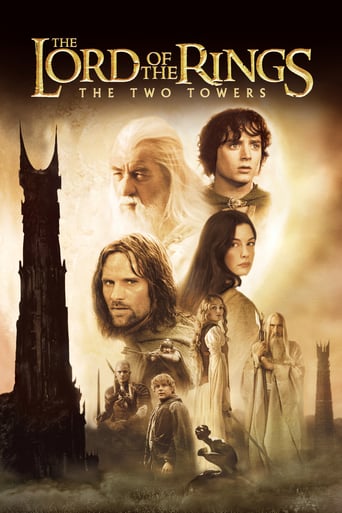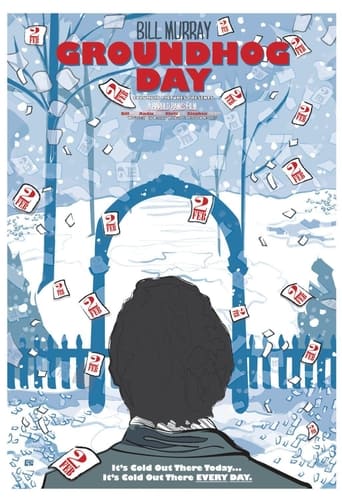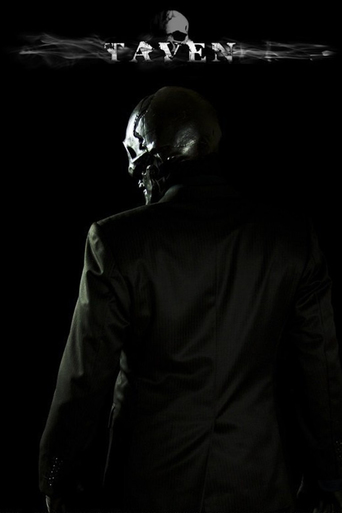Faust (1926)
God and Satan war over earth; to settle things, they wager on the soul of Faust, a learned and prayerful alchemist.
Watch Trailer
Cast


Similar titles

Reviews
the audience applauded
Better Late Then Never
An Exercise In Nonsense
The story, direction, characters, and writing/dialogue is akin to taking a tranquilizer shot to the neck, but everything else was so well done.
I saw Faust last night at a special event at the Paramount theater in Seattle with live organ accompaniment. The hosts relentlessly hyped the movie, so when it started, I had high expectations. I was not disappointed. Faust wastes no time by explaining how portals from Hell opened up and wraiths are running free over the Earth. This is an instant hook, but then it gets better as a head angel makes a bet with the devil Mephisto. So what is there that could go wrong?This movie has world-class production design to complement that it takes place in an apocalyptic, post-biblical fantasy time. Personally, I'm not much a fan of the worlds typical to fantasy stories, but the one in Faust is original and creative.The story follows a young Faust chasing after women and happiness in his new, young body. He finally finds one girl who becomes his only goal. This is fine and tells a perfectly good story. My objection is that the beginning shows us angels, demons, the devil, and the plague. Then the story goes down to deal with small-scale issues, looking at Faust's corruption really close up. This isn't necessarily bad, and the story goes back to its large-scale issues at the end, which has plenty of emotional and physical violence to balance out with Act I. I found it distracting that the jump was made to smaller battles, but these smaller battles are on the emotional side, making them far more important and interesting.Though Faust isn't subtle with its themes, it tells a story that moves right along, despite being seen as "one of those old silent films." The acting can be appreciated without looking down on old styles or thinking them archaic. The movie is dark, but Satan himself is a source of humor in some scenes. I see a lot of people who don't want to watch anything pre-50's and 60's, but right back at the beginning of cinema, there's entertainment, emotion, sex, violence, and comedy present in the same movie. Thank you, Faust.
I just watched the F. W. Murnau silent film version of Faust from 1926 and it was surprisingly good. It's from the director of Nosferatu and heavily based on the Goethe version of the Faust legend, not the Christopher Marlowe verison.Marlowe's Faust ends in a bleak and very hopeless kind of way whereas Goethe has Faust redeemed at the end with the idea that caring about others and love is the most powerful and most transcendent force in the universe and that, as it is the ultimate goodness, you cannot be damned if you can love.This silent film is heavily based on the more hopeful version of the story by Goethe, containing elements of both part 1 and part 2 of Goethe's Faust. I strongly recommend this for anyone who is a fan of Goethe's version of Faust. I sort of wish it would get a remake, still set in the fifeenth / sixteenth century and with the same ending (even if people do find the idea of love redeeming you to be saccharine). I think we need stories like this. And it is a shame the Goethe version of Faust isn't more well known in the English speaking world.
Some filmmakers just love to go all out on style. Friedrich Wilhelm Murnau was just such a one. He loved camera movement, superimpositions, attention-grabbing shot compositions, stylised theatrical acting – the full works. Now, things like this will absolutely ruin a good drama, but if your subject matter is just as fantastical as your technique you can just about get away with something truly wonderful. Faust, the archetypal German fairytale, provides Murnau with the opportunity he requires to indulge his love of trickery and showmanship.Murnau was by now very good at this sort of thing. Eschewing any form of naturalism he stages Faust operatically, carefully controlling the rhythm and flow from shot to shot. The rhythmic touch is present and precise in every single moment, giving extra zip to even little things, such as the young Faust's eyes suddenly snapping open when his image is first glimpsed in a bowl of water. His images are often exaggerated and painterly, a particularly fine example being when the plague-ridden acrobat collapses dead over the edge of the stage. And in Faust's world of magic and mystery, the shimmering special effects and expressionistic shadows work, while the rather unconvincing puppetry has a theatrical charm to it that is totally in keeping with the spirit of the whole piece.Just as the direction is operatic, so too run the performances. Master of disguise Gösta Ekamn makes this a Faust of grand gestures and stylised movements that are almost musical. Jolly fat man Emil Jannings is especially good at this form of acting, hamming it up grandly but still keeping up the cheeky comedy persona for which he was best loved. You can see how much control Jannings has over his movements in his first appearance at the crossroads. He doffs his cap in an extremely smooth motion, in a manner that is very eerie but also rather comical in its unexpectedness. The exaggerated performing doesn't suit everyone however. Leading lady Camilla Horn alternates between twitching like a startled gazelle and plodding about like a zombie. Generally though the stylised acting works here because it is all a part of the twisted fairytale world in which the story takes place.As Faust shows, style over substance does have its place. And yet a picture like this, with very little to it apart from pretty pictures and neat effects, is under a lot of pressure to be consistently dazzling and engaging. Unfortunately, Faust does start to get a little tedious after the first hour. An extended comedy sequence between Jannings and French comedienne Yvette Guilbert is particularly disruptive to the overall flow, and only demonstrates that the picture's humour works better when it occurs in by-the-way fashion amid the action. Admittedly, the whole thing is pulled together for an impressive finale, but by this time the audience has been somewhat tried and the impact is not quite what it could have been.
Murnau's masterpiece captures the Gothic genius of the original folktale—and it is obvious that such a story would never have came from a Latin or even Slavic people—it required the uncanny Gothic genius. In these Germanic peoples the platitude (the banality, the philistinism, the petty bourgeois dullness) and the Gothic coexist.Gretchen is both nice and well played; Murnau's Faust is a creepy metaphysical romance, made with flawless taste and snappy aplomb by the German director. Now Murnau's genuine flair for the Gothic and the weird is obvious—his sets are made out of light and darkness, the Christian element (of rituals, practices, customs) is strongly contrasted with the chaos and delusion brought by Faust's new master.Notice that the protagonist, Doktor Faust, is a scientist—or an alchemist, anyway, not a meta-physician, but rather an enquirer of the nature, like Dr Frankenstein. For the folk, the idea of philosopher is that of a naturalist, of a scientist, even an alchemist or an occults, not of a speculative thinker. Think a little about these: Faust—Marlowe—Goethe—Hegel—Mann—Bulgakov—Frankenstein.

